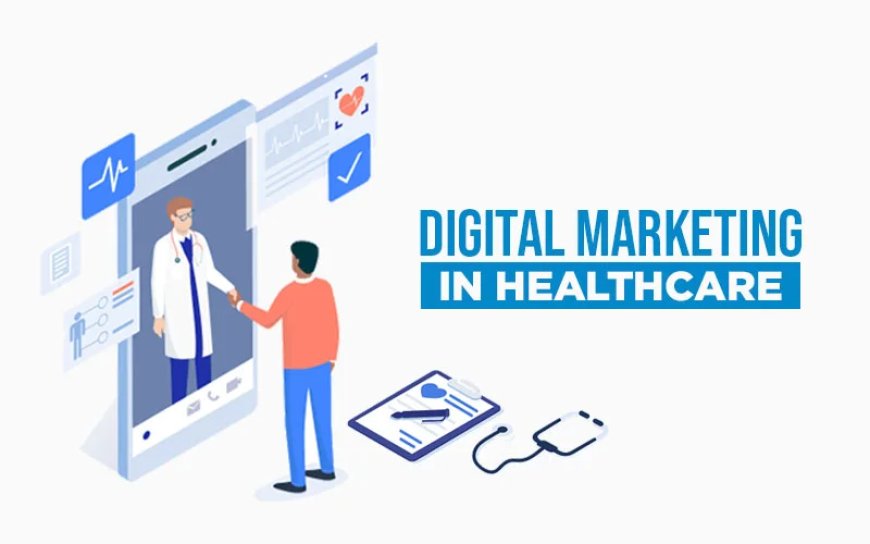How Social Media Marketing Is Revolutionizing Hospitals: What Every Healthcare Facility Must Know to Stay Relevant

Introduction:
In a world where health decisions often begin with a Google search or an Instagram reel, hospitals can no longer afford to stay silent online. Today’s patients don’t just look for the nearest hospital—they search for the most trusted, engaging, and responsive one. That trust, engagement, and responsiveness? It's often born on social media.
Social media marketing for hospitals is no longer a luxury—it's a necessity. It bridges the gap between sterile walls and human stories. Whether it’s updating patients about health camps, sharing recovery journeys, or busting medical myths, the digital realm is your loudspeaker.
In this guide, we’ll unpack the ins and outs of social media marketing for hospitals, from crafting strategy to handling FAQs, busting myths, and ending with a roadmap to make your hospital not just seen—but remembered.

Why Social Media Matters for Hospitals
1. Patients Are Online, So Should You Be
Nearly 80% of internet users search for health-related topics online. From checking symptoms to reading reviews, people turn to Facebook, YouTube, and Instagram long before they step into a hospital. By using social media marketing for hospitals, healthcare institutions can meet patients where they already are—on their screens.
2. Build Trust Through Transparency
A hospital is a place where emotions run high—joy, fear, hope, relief. Sharing real patient stories, behind-the-scenes glimpses of staff, and health awareness tips brings a human face to your facility. It’s about building relationships before the patient even walks in.
3. Real-Time Communication
From vaccination drives to emergency notices, social media allows hospitals to communicate quickly and effectively with the public. It becomes a live channel to provide updates, debunk fake news, and show responsiveness.
Benefits of Social Media Marketing for Hospitals
1. Increased Patient Engagement
Interactive posts like health quizzes, Q&A sessions with doctors, or live health seminars can skyrocket engagement. When people like, comment, and share, your hospital becomes a familiar name in their circles.
2. Enhanced Brand Awareness
A hospital might have top-notch surgeons, but without digital visibility, they remain unsung heroes. Social media helps broadcast your specialties, achievements, and infrastructure to a wider audience.
3. Improved Patient Education
With misinformation just a click away, social media gives hospitals a platform to educate the public. Infographics, reels, and blogs on common conditions, prevention tips, or first-aid advice can go viral while genuinely helping people.
4. Cost-Effective Marketing
Compared to traditional billboards and TV ads, social media marketing for hospitals is cost-effective. A well-placed Instagram ad or a boosted Facebook post can reach thousands at a fraction of the price.
Crafting a Winning Social Media Strategy for Hospitals
Set Clear Goals
Before jumping into posting, define what you want to achieve. Is it more patient footfall? More website traffic? Improved public trust?
Know Your Audience
Understanding who you're speaking to—young adults, senior citizens, mothers-to-be—can help tailor content that resonates.
Choose the Right Platforms
-
Facebook: Ideal for community updates, events, and reviews
-
Instagram: Best for visuals—stories, reels, behind-the-scenes, and staff features
-
YouTube: For educational videos, success stories, and doctor interviews
-
LinkedIn: Highlighting achievements, networking with other institutions
Content Is King
Keep content varied and valuable:
-
Educational posts (how to prevent diabetes)
-
Success stories (real patient journeys)
-
Behind-the-scenes (day in the life of a nurse)
-
Health tips (quick bites for the busy user)
Engage, Don’t Just Broadcast
Reply to comments, answer questions, and thank patients for positive reviews. Social media isn’t a one-way street.
Monitor and Optimize
Track analytics—what posts perform best, what time works, what kind of content your audience prefers. Adjust your strategy accordingly.
Real-Life Content Ideas for Hospital Pages
Weekly Themes
-
Monday Motivation: Share a recovered patient’s story
-
Wellness Wednesday: Post a prevention tip
-
Friday Facts: Debunk a common health myth
Doctor Features
Introduce doctors with short reels or fun facts about their profession. Helps break the "white-coat" barrier.
Facility Highlights
Is your hospital getting a new MRI machine? Share a time-lapse video of the installation. People love tech.
Myths vs Facts About Social Media Marketing for Hospitals
| Myth | Fact |
|---|---|
| Social media is unprofessional for hospitals | Social media adds personality and builds trust when used ethically |
| Only big hospitals need it | Even small clinics gain massive visibility and patient trust via social media |
| One platform is enough | Different platforms reach different demographics; variety is key |
| Posts must always be serious | Light-hearted, respectful content humanizes your brand and increases engagement |
| It’s too time-consuming | With the right strategy, a small team or agency can manage it efficiently |
FAQs – Social Media Marketing for Hospitals
Q1: Is social media really effective for hospitals?
Yes. Social media marketing for hospitals increases visibility, builds community trust, and provides a platform for patient education.
Q2: What type of content should hospitals post?
Educational tips, health awareness campaigns, patient testimonials, staff introductions, and live sessions with doctors are ideal.
Q3: Can hospitals advertise on social media?
Yes, but with sensitivity. Promote services without exploiting patient fear or breaching privacy. Follow local regulations regarding healthcare advertising.
Q4: How often should a hospital post on social media?
At least 3–5 times a week. Consistency matters more than frequency.
Q5: Should hospitals respond to comments and messages?
Absolutely. Engagement builds credibility. A prompt and respectful reply can turn a curious visitor into a loyal patient.
Ethical Considerations in Social Media for Hospitals
-
Patient Privacy: Never share photos or stories without written consent
-
Accuracy: Post only verified medical information
-
Professional Tone: Keep messaging empathetic and respectful
-
No Medical Advice in DMs: Encourage followers to consult doctors offline for personal issues
Challenges Hospitals Face (And How to Overcome Them)
1. Limited Staff Bandwidth
Solution: Outsource to agencies or appoint a digital-savvy in-house team. Use scheduling tools like Buffer or Hootsuite.
2. Fear of Negative Reviews
Solution: View them as opportunities. Respond professionally, apologize if needed, and offer to resolve offline.
3. Content Burnout
Solution: Plan a monthly content calendar with themes, reuse long-form content as snippets, and encourage staff-generated content.
Conclusion: The Future of Healthcare Is Social
Social media marketing for hospitals is not just a trend—it’s a transformation. In a world of scrolling thumbs and short attention spans, a single post can make your hospital a household name. It can educate, connect, and inspire. It can bring a smile to someone worried about a diagnosis or encourage a mother to book that long-overdue checkup.
It’s time to stop treating social media as optional and start embracing it as a vital extension of your hospital’s voice.

Ready to Get Started?
If your hospital is still quiet on social media, now is the moment to begin. Start with one platform. Share your stories. Educate your audience. Be consistent. And most importantly—be human.
Let the world know that behind every ward and every waiting room, there’s a team that cares, heals, and listens.
What's Your Reaction?






























































